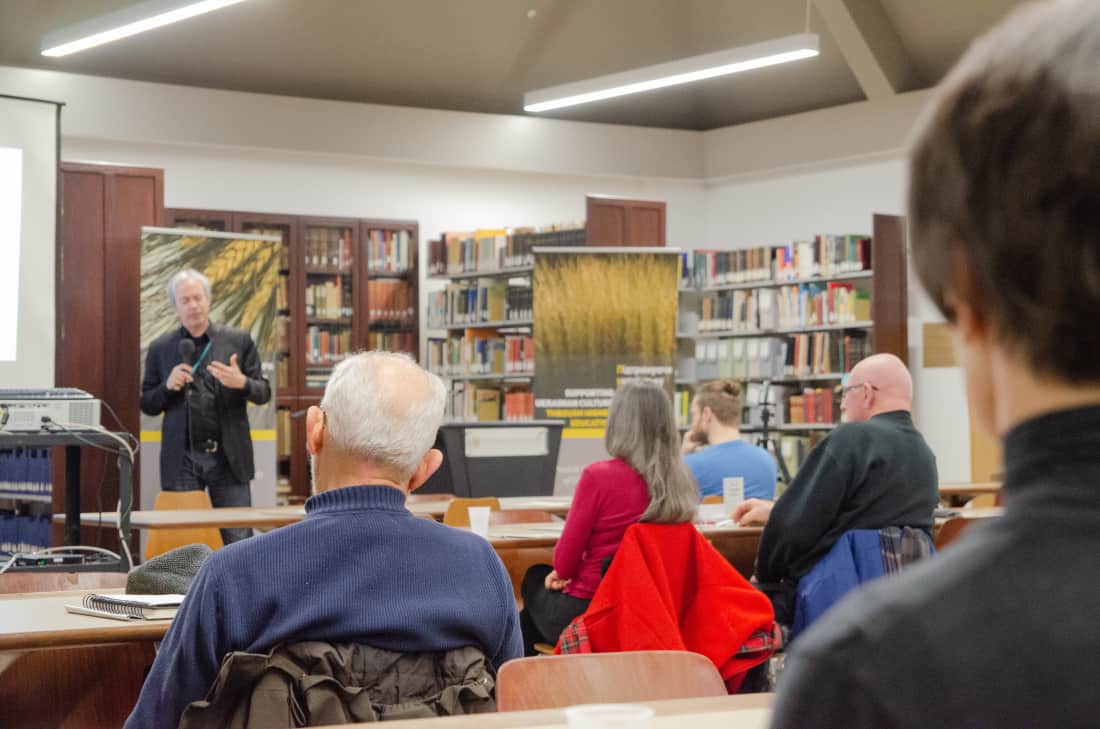
After six years and a growing list of casualties, a political studies professor says the War in Donbas needs a permanent ceasefire, even if it means compromise for Ukraine.
Little has changed in terms of the boundaries, says Dominique Arel, a professor and chair of Ukrainian Studies at the University of Ottawa. With the death toll estimated over 13,000, Ukrainians face a heavy price for defending their Eastern border.
At the annual Mohyla Lecture, Arel spoke about the origin and consequences of the war to an audience largely made up of members from the Ukrainian-Canadian community.
It seems unlikely that Russian-backed forces will depart Donbas and restore it to Ukraine, according to Arel’s analysis of the active war.
“I’m not sure I’m gonna be popular tonight just saying that,” Arel admitted with a little laugh, hours before the lecture. “But then, you know, the message [in] the end is hopeful.”
Political compromise is a difficult topic to broach when advocating for anything less than total territorial sovereignty is sometimes seen as treacherous. Canada, in particular, is known for being an ardent supporter of Ukraine, providing military training and humanitarian aid.
But Arel makes the point that with international relations, it is important to be realistic about negotiations. Rather than telling Ukrainians which options they should pursue, he is laying out the options so Ukraine can decide on what they see as the best course of action.
“It’s less what is it that we would like to happen as opposed to what is possible. What is possible and what is ultimately positive for Ukraine,” Arel said.
While there was a ceasefire established in 2015, it has gone unrecognized for years. The priority for Arel is for conflict to be suspended while diplomatic talks continue.
Almost a year ago, Ukraine established Volodymyr Zelensky as its president, winning over the incumbent Petro Poroshenko, who took power in 2014. Zelensky, who is from the Eastern region, vowed to end the war, something his predecessor was not able to do.
“He doesn’t want the war to go on as a live war,” Arel said about President Zelensky. “If he makes it a cold war, that’s already a huge improvement. Nothing is solved politically, but at least people are not dying anymore.”
But even if negotiations led to possible reintegrating of the region, pro-Russian sentiment is a pre-existing condition that would present difficulties.
The four-month gap before police lost control and Russian-backed forces entered Donbas means that even after a ceasefire, there might still be a pro-Europe, pro-Russia divide in Ukraine.
“The Ukrainian government lost control of the territory before there was an actual systematic military intervention. And that is the really difficult part to understand and then to figure out what it means going forward,” Arel said.
Not everything is hopeless though. Arel says that Ukraine is much stronger now than it was six years ago. Especially in comparison to neighbouring Poland and Hungary, who have both relapsed to a more authoritarian style of rule.
“The whole thing is that, de facto, there’s a number of indicators — despite all the problems, it shows that Ukraine is making progress.”
—
Nykole King/ Editor-in-Chief
Photo: Nykole King/ Editor-in-Chief
Leave a Reply